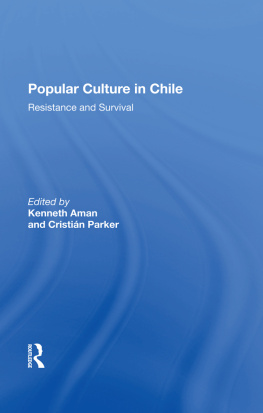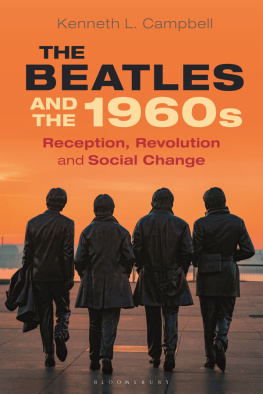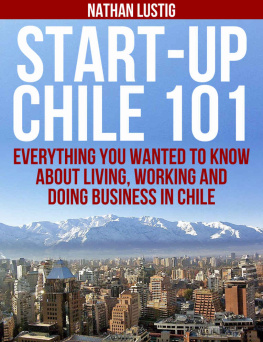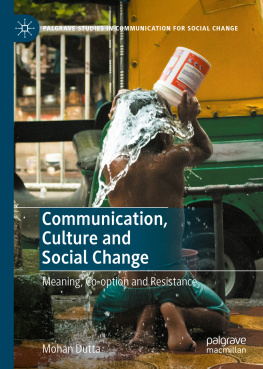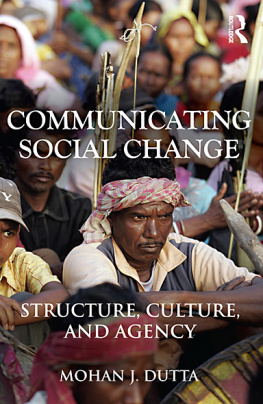Popular Culture in Chile
First published 1991 by Westview Press
Published 2019 by Routledge
52 Vanderbilt Avenue, New York, NY 10017
2 Park Square, Milton Park, Abingdon, Oxon OX14 4RN
Routledge is an imprint of the Taylor & Francis Group, an informa business
Copyright 1991 Taylor & Francis
All rights reserved. No part of this book may be reprinted or reproduced or utilised in any form or by any electronic, mechanical, or other means, now known or hereafter invented, including photocopying and recording, or in any information storage or retrieval system, without permission in writing from the publishers.
Notice:
Product or corporate names may be trademarks or registered trademarks, and are used only for identification and explanation without intent to infringe.
Library of Congress Cataloging-in-Publication Data
Popular culture in Chile : resistance and survival / edited by Kenneth
Aman and Cristin Parker.
p. cm. (Westview special studies on Latin America and the
Caribbean)
Includes bibliographical references.
1. ChilePolitics and government1973. 2. ChilePopular
culture. I. Aman, Kenneth. II. Series.
F3100.P675 1991
983.0647dc19
88-19055
CIP
ISBN 13: 978-0-367-28384-1 (hbk)
To the campesinos and pobladores of Chile, the men, women, and children who live and die at the margins of political and economic power, who have created and continue to sustain their own culture
Contents
, Kenneth Aman
PART ONE
HISTORICAL PERSPECTIVES
, Gabriel Salazar
, Cristin Parker
PART TWO
DIMENSIONS OF POPULAR CULTURE
, Toms Moulin
, Luis Razeto
, Teresa Valds
, Carolyn Lehmann
, Jos Weinstein and Juan Eduardo Garca-Huidobro
, Maximiliano Salinas
, Sergio Mar tinte
, Carlos Ochsenius
, Isabel Donoso
, Kenneth Aman
Guide
Putting a book like this together resembles life within a popular culture in at least one respectone is dependent on a great number of people. First, we are indebted to the contributors themselves. Not only did they provide individual chapters, but also several suggested important corrections or helped us in fashioning a conceptual framework for the book as a whole, this despite the fact that no similar volume exists in Chile. Also, we wish to thank those who typed or assembled materials in Santiago, especially Isabele Margarita Rojas, Enrique Acosta, Anglica Crooker, and the other members of the Religion and Society Concentration of the Centro de Estudios de la Realidad Contempornea.
It was a strenuous exercise in cross-cultural understanding to translate the insights of many Chilean authors into English. The following people were essential in offering the first English versions of very different (and challenging) essays: Laurie Pratt (Razeto and Ochsenius), Theresa Bruno (Weinstein and Garcia-Huidobro), Eileen OConnor (Valdes) and Kathy de las Heras (Martinic). After many years of living in Chiles poblaciones and working with its people, Terry Cambias has superb qualifications for functioning as translating editor. He did the first versions of almost all other essays and, in addition, helped to fine-tune the entire volume.
A number of North American and Latin American coljeagues were supportive and offered key services. Lee Cormie of the University of Toronto was an indispensable part of many conversations with Chileans about popular culture in 1986 and again in 1990. We learned a great deal from his penetrating questions and observations. Juan Corradi of New York University was generous with his time and encouraging when the concept of this book was still embryonic. John Donohue, of Trinity University in San Antonio, was a great help in sorting out some conceptual tangles at a crucial juncture. Among the faculty at Montclair State, Adele McCollum, Laura Kramer, and Alice Freed read and commented on various chapters. Joanne Englebert was insightful concerning the pitfalls to be avoided in translation. The entire library staff at Montclair State College was unfailingly cheerful, but Tom Trone and Edward Gil helped track down some exceedingly obscure references. The input of Barbara Ellington and Julie Rold of Westview Press and Cheryl Carnahan, the copy editor, clearly made this a better book. Last but hardly least, Becky Redington, secretary for the Department of Philosophy/Religious Studies at Montclair, remained her unruffled self while taking care of a dozen different tasks.
With computer disks shuttling between North America and Chile, technical problems in assembling the different chapters inevitably arose. David Stuehler, Tim Renner, David Kelly, Ed Haupt, Jim Myers, and Jean Barrett all helped to extricate us from uncomfortable corners. We are, however, particularly indebted to David Benfield. He gave countless hours of his time to rationalize and stabilize what was initially a highly shaky computer system.
We are also grateful for some important financial and institutional support. The 1988 Santiago conference on popular culture was sponsored and supported by the Academia de Humanismo Cristiano (now a university). On two different occasions, Montclair State College granted Kenneth Aman Separately Budgeted Research Grants for research and writing. With a small grant, the Montclair State Alumni Association enabled us to begin translation. The Maryknoll Fathers helped us, with a generous gift, to finish the task of translation and to cover certain other expenses.
Finally, we are deeply indebted to our families for their unstinting good humor and moral support, offered when it was most needed. To the members of the Parker familyIsabel Serrano, Cristin Junior, Gabriela, and Ignaciaand to Lenore and Julia Smith-Aman, our heartfelt thanks.
Kenneth Aman
Cristin Parker
1
Introduction: Placing Chiles Popular Culture in Context
Kenneth Aman
Kenneth Aman is professor of philosophy and religion at Montclair State College. He has visited Chile several times, most notably in 19851986 when he and his family spent most of a sabbatical year there. They had the unusual experience of living in a typical poblacin, the same milieu that figures prominently in virtually every chapter of this volume. Aman, who has published widely on Latin American liberation theology, turned his research interests to popular culture after encountering it directly and interviewing a number of scholars. He was particularly impressed by the opportunities and challenges this culture offers to Christians. Aman is also the editor of Border Regions of Faith: An Anthology of Religion (Orbis Books, 1987).
In May 1986, during a sabbatical year in Chile, I had to make a brief visit to the United States. I was nervous for my wife and daughter, who were staying behind in one of Santiagos numerous poblaciones , or poor urban areas.quite different world from that of the prosperous middle-class areas that are more familiar to most European and North American visitors.
The difference cannot be measured simply by economic standards or material resources. It involves profoundly different forms of life and, indeed, different and exclusive perceptions of virtually every dimension of lived reality: family, work, sex, religion, society, government, and education. According to many Chilean commentators, it is a matter of two cultures. The first culturemore coherent and more visibleis displayed every evening on television, in the gourmet restaurants scattered about Santiago and other cities, in the powerful newspaper El Mercurio , and perhaps most of all in the beautiful garden apartments and gracious homes of Providencia, Las Condes , and other comfortable middle-class sections. In sharp contrast are the values, customs, organizational forms (one hesitates to use the term institutions ), daily routines, and social pressures that shape the second culture, shared by masses of working-class, underemployed, and unemployed citizens. It is this latter complex that is commonly called popular culture , in Chile as in much of Latin America.

